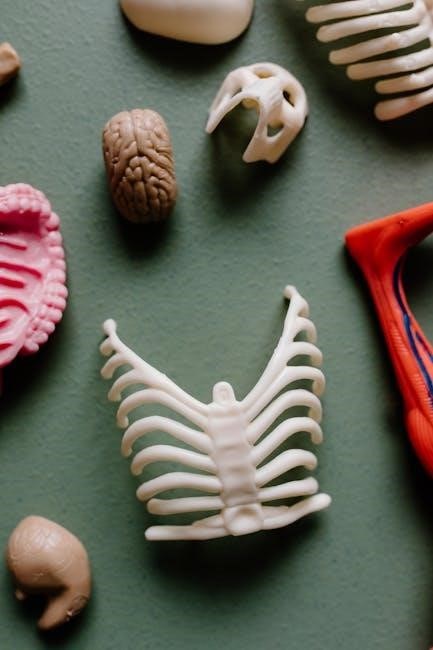Nursing test banks are comprehensive collections of practice questions designed to aid students in preparing for exams, covering topics like fundamentals, medical-surgical nursing, and pharmacology․
1․1 What Are Nursing Test Banks?
Nursing test banks are collections of practice questions designed to help nursing students and professionals prepare for exams․ They cover various nursing topics, such as medical-surgical, pediatric, and pharmacology․ These test banks often include multiple-choice questions, case studies, and detailed rationales to enhance understanding․ They are widely used for licensure exams like the NCLEX and for reinforcing classroom learning․ Test banks provide realistic practice, helping nurses assess their knowledge and identify areas for improvement, making them invaluable study tools․
1․2 Importance of Nursing Test Banks in Nursing Education
Nursing test banks play a vital role in education by bridging the gap between theoretical knowledge and practical application․ They provide students with realistic exam simulations, helping them familiarize with question formats and timing․ Test banks enhance critical thinking and problem-solving skills, essential for patient care․ They also allow instructors to assess student understanding and identify knowledge gaps․ By offering detailed rationales, test banks reinforce learning and improve retention, making them indispensable tools for nursing education and licensure preparation․
1․3 History and Evolution of Nursing Test Banks
Nursing test banks have evolved significantly, transitioning from traditional paper-based question sets to digital platforms․ Initially used for basic assessment, they now cover diverse nursing topics and question formats․ The rise of licensure exams like NCLEX drove their expansion, incorporating detailed rationales and real-world scenarios․ Modern test banks are updated regularly to reflect current practices and educational standards, offering interactive features and comprehensive coverage for effective learning and exam preparation․

Types of Nursing Test Banks
Nursing test banks vary widely, including NCLEX, medical-surgical, pediatric, pharmacology, maternal-newborn, and mental health editions, each tailored to specific nursing disciplines and educational needs․
2․1 NCLEX-RN and NCLEX-PN Test Banks
NCLEX-RN and NCLEX-PN test banks are essential resources for nursing students preparing for licensure exams․ They contain multiple-choice questions simulating real exam formats, covering critical thinking, patient care, and clinical judgment․ These test banks provide detailed rationales to enhance understanding․ Regular practice with these tools helps students identify weak areas and improve test-taking strategies, ensuring readiness for the NCLEX exams․
2․2 Medical-Surgical Nursing Test Banks
Medical-surgical nursing test banks are specialized resources focusing on adult health and surgical care․ They cover topics like patient assessment, pharmacology, and surgical interventions․ These test banks include multiple-choice questions that simulate clinical scenarios, helping students apply theoretical knowledge to practical situations․ Detailed rationales are provided to clarify correct and incorrect answers, enhancing learning․ Regular use of these test banks improves critical thinking and prepares students for exams, ensuring competence in medical-surgical nursing․
2․3 Pediatric Nursing Test Banks
Pediatric nursing test banks focus on child health and developmental care․ They include questions on growth milestones, common illnesses, and age-specific nursing interventions․ These resources help nurses understand pediatric-specific conditions and treatments, enhancing their ability to provide appropriate care․ The test banks often feature multiple-choice questions and case studies, simulating real-world scenarios․ Regular practice with these tools improves clinical judgment and prepares nurses for the unique challenges of caring for infants, children, and adolescents in various healthcare settings․
2․4 Pharmacology and Medication Administration Test Banks
Pharmacology and medication administration test banks focus on drug therapies, dosing calculations, and safe administration practices․ These resources cover key topics like medication side effects, drug interactions, and patient-specific regimens․ They include multiple-choice questions and case studies to assess understanding of pharmacological principles․ Regular practice with these tools enhances nurses’ ability to administer medications safely and effectively, improving patient outcomes․ The questions are designed to reflect real-world scenarios, ensuring nurses are well-prepared for clinical challenges in medication management․
2․5 Maternal-Newborn Nursing Test Banks
Maternal-newborn nursing test banks focus on prenatal, postpartum, and neonatal care․ They cover topics like pregnancy complications, labor, delivery, and newborn assessments․ These resources include multiple-choice questions and case studies to evaluate understanding of maternal and newborn health․ Practice questions address high-risk pregnancies, neonatal complications, and breastfeeding support․ They help nurses apply theoretical knowledge to real-world scenarios, ensuring safe and effective care for mothers and newborns․ Regular use enhances clinical decision-making and patient outcomes in maternal-newborn settings․
2․6 Mental Health and Psychiatric Nursing Test Banks
Mental health and psychiatric nursing test banks cover topics like psychopathology, therapeutic communication, and crisis intervention․ These resources include questions on anxiety, depression, and schizophrenia․ They also address legal and ethical issues, such as patient confidentiality and involuntary commitment․ Practice questions focus on assessment techniques, medication management, and non-pharmacological interventions․ These test banks help nurses develop critical thinking skills for providing holistic care to mentally ill patients․ Regular practice enhances their ability to manage diverse psychiatric scenarios effectively․

Benefits of Using Nursing Test Banks
Nursing test banks enhance test-taking skills, improve knowledge retention, and identify weak areas․ They familiarize students with exam formats, boosting confidence and readiness for professional challenges․
3․1 Improved Test-Taking Skills
Nursing test banks enhance test-taking skills by exposing students to diverse question formats, including multiple-choice, true/false, and case studies․ Consistent practice builds familiarity with exam structures, reducing anxiety and improving time management․ Students learn to prioritize questions, manage their pacing, and develop strategies for tackling challenging items․ Regular use of test banks helps refine critical thinking and decision-making abilities, essential for success in high-stakes nursing exams like the NCLEX․ This practice fosters confidence and improves overall performance․
3․2 Enhanced Knowledge Retention
Nursing test banks improve knowledge retention through repeated exposure to key concepts and practical application; By engaging with a variety of questions, students reinforce their understanding of critical nursing topics․ The structured format of test banks encourages active learning, reducing the likelihood of forgetting essential information․ Additionally, the ability to review rationales and explanations after each question enhances comprehension, ensuring long-term retention of complex nursing principles and practices․
3․3 Identification of Weak Areas
Nursing test banks help identify knowledge gaps by assessing performance across various topics․ By analyzing incorrect answers, students can pinpoint areas needing improvement․ This targeted approach enables focused studying, ensuring a well-rounded understanding of nursing concepts․ Regular use of test banks also reveals recurring weaknesses, allowing for tailored study plans to address them effectively and build a stronger foundation for future exams and professional practice․
3․4 Familiarization with Exam Formats
Nursing test banks familiarize students with exam formats, including question types and time constraints․ By practicing with realistic test simulations, students adapt to the structure and pacing of actual exams․ This preparation reduces anxiety and enhances performance․ Exposure to various question formats, such as multiple-choice and case studies, mirrors real testing scenarios, ensuring students are well-prepared and confident on exam day․
3․5 Boosting Confidence
Nursing test banks boost confidence by allowing students to practice and master content in a low-stakes environment․ Regular practice helps students feel more assured in their abilities, as they become familiar with question formats and content․ Successfully answering questions builds self-assurance, while immediate feedback highlights areas for improvement․ This iterative process reduces exam anxiety and empowers students to approach real exams with greater confidence and a stronger belief in their knowledge and skills․

How to Use Nursing Test Banks Effectively
Nursing test banks enhance learning by providing structured practice, helping students identify weak areas and improve test-taking skills through realistic exam simulations and detailed rationales․
4․1 Setting Study Goals
Setting clear study goals with nursing test banks helps focus on specific areas, improving efficiency․ Prioritize topics based on exam weightage and personal weaknesses to maximize learning outcomes effectively․
4․2 Practicing Under Timed Conditions
Practicing with timed conditions using nursing test banks simulates real exam environments, enhancing time management and decision-making skills․ This approach helps build stamina and reduces anxiety, ensuring better performance during actual assessments;
4․3 Reviewing Explanations and Rationales
Reviewing explanations and rationales from nursing test banks deepens understanding of correct and incorrect answers․ This step reinforces learning, clarifies doubts, and helps identify knowledge gaps, improving overall comprehension and retention of nursing concepts․
4․4 Focusing on High-Weightage Topics

Identifying high-weightage topics in nursing test banks ensures efficient study․ By prioritizing frequently tested areas like pharmacology or medical-surgical nursing, students can allocate time effectively, enhancing exam preparedness and performance․
4․5 Using Test Banks as a Supplement to Textbooks
Nursing test banks complement textbooks by offering practical application of concepts․ They provide diverse question formats, reinforcing textbook content and helping students apply theoretical knowledge in real-world scenarios, thus enhancing understanding and retention․

Features of a Good Nursing Test Bank
A good nursing test bank should include comprehensive coverage of topics, updated questions, detailed explanations, and multiple question formats, ensuring a well-rounded study experience for students․
5․1 Comprehensive Coverage of Nursing Topics
A good nursing test bank should cover a wide range of topics, including fundamentals, medical-surgical nursing, pediatrics, pharmacology, and mental health․ This ensures students are well-prepared for various exams and clinical scenarios․ Comprehensive coverage helps in understanding key concepts, from basic care to complex conditions․ It also includes questions on emerging trends and evidence-based practices, making it a valuable resource for both students and educators․ This breadth ensures no topic is left unaddressed, promoting holistic learning and exam readiness․
5․2 Updated and Relevant Questions
Updated and relevant questions in a nursing test bank ensure students practice with current exam patterns and content․ Regularly refreshed questions reflect the latest advancements in nursing practices, ensuring preparation aligns with modern standards․ This feature helps students stay informed about new guidelines, technologies, and methodologies in healthcare․ Relevant questions also focus on high-weightage topics, enhancing exam readiness and clinical competence․ Accuracy and timeliness of content are crucial for effective learning and successful exam outcomes in nursing education․
5․3 Detailed Rationales and Explanations
Detailed rationales and explanations are essential features of a good nursing test bank․ They provide students with clear insights into why certain answers are correct or incorrect, fostering deeper understanding․ These explanations often include clinical context, helping learners connect theoretical knowledge to real-world scenarios․ By reviewing rationales, students can identify gaps in their understanding and improve critical thinking skills․ This feature also helps in retaining information effectively, making it a valuable tool for both exam preparation and long-term professional development in nursing;
5․4 Multiple Question Formats
A good nursing test bank offers multiple question formats, including multiple-choice, true/false, fill-in-the-blank, and case studies․ These formats simulate real exam scenarios, enhancing preparedness․ They challenge students to think critically and apply knowledge in diverse ways․ Interactive formats like drag-and-drop exercises boost engagement․ Exposure to varied question types ensures well-rounded understanding and improves problem-solving skills․
5․5 User-Friendly Interface
A good nursing test bank features a user-friendly interface that simplifies navigation and enhances the study experience․ Key elements include intuitive menus, robust search functions, and accessible question filters․ Multi-device compatibility ensures seamless access on computers, tablets, and smartphones․ Clear question displays and easy-to-use tools for reviewing answers and rationales further improve efficiency․ A well-designed interface reduces frustration and allows students to focus on learning, making the test bank an invaluable study resource․

Popular Nursing Test Bank Resources
Popular nursing test bank resources include NCLEX Next Gen, Fundamentals of Nursing, Medical-Surgical Nursing, Pharmacology, and NursingExamBank, offering diverse practice questions for effective exam preparation․
6․1 NCLEX Next Gen Test Bank
The NCLEX Next Gen Test Bank is a cutting-edge resource designed to prepare nursing students for the updated licensure exams․ It features a wide range of questions, including extended drag-and-drop, matrix-style, and Cloze items, reflecting the new exam format․ With detailed rationales and explanations, it helps students understand complex concepts and improve critical thinking․ Regular updates ensure relevance, making it a trusted tool for mastering the NCLEX Next Gen content and achieving success in the nursing profession․
6․2 Fundamentals of Nursing Test Bank
The Fundamentals of Nursing Test Bank provides a comprehensive collection of questions covering essential nursing concepts, such as patient care, vital signs, and safety protocols․ Designed to help students build a strong foundation, it includes multiple-choice questions, case studies, and detailed explanations․ Regular updates ensure the content aligns with current nursing practices, making it an invaluable resource for mastering fundamental skills and preparing for exams․ It supports both students and educators in achieving learning and teaching goals effectively․
6․3 Medical-Surgical Nursing Test Bank
The Medical-Surgical Nursing Test Bank focuses on adult health and surgical care, offering a wide range of practice questions․ It covers topics like pre- and post-operative care, pharmacology, and chronic conditions․ Designed to enhance clinical reasoning, the test bank includes multiple-choice questions, case studies, and detailed rationales․ Regular updates reflect the latest medical advancements, ensuring students and educators have access to relevant and challenging material to master medical-surgical nursing concepts effectively․
6․4 Pharmacology and Medication Administration Test Bank
The Pharmacology and Medication Administration Test Bank provides in-depth practice questions on drug classifications, dosages, and administration methods․ It addresses potential drug interactions, side effects, and patient-specific considerations․ This resource is tailored for nursing students to enhance their understanding of pharmacological principles and safe medication practices․ Regular updates ensure the content remains current with emerging medications and treatment guidelines, making it an essential tool for both learning and exam preparation․
6․5 NursingExamBank
NursingExamBank offers a wide range of practice questions for nursing students, covering topics such as anatomy, physiology, fundamentals, pharmacology, and med-surg․ It provides instant downloads of verified test banks, ensuring comprehensive coverage and up-to-date content․ This resource is designed to help students familiarize themselves with exam formats and track their progress effectively․ Its user-friendly interface and focus on essential nursing subjects make it a valuable tool for exam preparation and continuous learning in the field of nursing․

The Role of Test Banks in Nursing Education
Nursing test banks bridge the gap between theory and practice, enhancing critical thinking and active learning․ They prepare students for licensure exams and support professional development effectively․
7․1 Bridging the Gap Between Theory and Practice
Nursing test banks effectively link theoretical knowledge to real-world scenarios, offering practical questions that mirror clinical situations․ This helps students apply concepts learned in textbooks to patient care, enhancing their ability to make informed decisions․ By simulating exam conditions, test banks prepare nurses for the challenges of actual practice, ensuring they can confidently transition from classroom learning to professional settings․
7․2 Preparing for Licensure Exams
Nursing test banks are invaluable for licensure exam preparation, offering realistic practice questions that simulate actual test environments․ They cover essential topics like pharmacology, medical-surgical nursing, and pediatric care, ensuring candidates are well-prepared; Regular use of these resources helps identify weak areas, improves time management, and builds confidence, leading to better performance on exams such as the NCLEX-RN and NCLEX-PN․
7․3 Enhancing Critical Thinking Skills
Nursing test banks enhance critical thinking by presenting realistic patient scenarios and case studies․ These questions require nurses to analyze symptoms, prioritize actions, and evaluate outcomes, mimicking real-world decision-making․ By engaging with diverse question formats, nurses develop the ability to apply theoretical knowledge to practical situations, improving their problem-solving abilities and clinical judgment․ This skill is essential for providing high-quality patient care and handling complex medical challenges effectively․
7․4 Promoting Active Learning
Nursing test banks foster active learning by engaging students in interactive practice․ They provide practical questions that simulate real-world scenarios, encouraging nurses to apply theoretical knowledge․ Through regular practice, nurses develop problem-solving skills and clinical reasoning, enhancing their ability to make informed decisions․ Test banks also offer immediate feedback, allowing learners to identify and address gaps in understanding, which reinforces retention and application of nursing concepts effectively․
7․5 Supporting Continuous Professional Development

Nursing test banks play a pivotal role in continuous professional development by offering updated resources that align with current nursing practices․ They provide nurses with the opportunity to refine their knowledge and skills through regular practice, ensuring they stay informed about new advancements in healthcare․ Additionally, test banks like NursingExamBank and NCLEX Next Gen Test Bank offer extensive question libraries, enabling nurses to assess their readiness for professional challenges and maintain lifelong learning in their field․

Common Mistakes to Avoid When Using Nursing Test Banks
- Overreliance on test banks without consulting textbooks․
- Ignoring weak areas identified by test results․
- Not reviewing rationales for incorrect answers․
- Practicing without setting clear study goals․
- Neglecting to track progress over time․
8․1 Overreliance on Test Banks
Overreliance on test banks can lead to a lack of deep understanding, as students may focus solely on exam-style questions rather than broader knowledge․ This can result in gaps in critical thinking and practical application․ Test banks are valuable tools but should not replace textbooks or hands-on learning․ Relying too heavily on them can create a false sense of preparedness, especially for complex clinical scenarios․ Balancing test bank practice with comprehensive studying is essential for holistic nursing education․
8․2 Ignoring Weak Areas
Ignoring weak areas while using nursing test banks can hinder progress and lead to poor exam performance․ Test banks help identify knowledge gaps, but neglecting these areas can result in unpreparedness for exams․ Students often focus on questions they answer correctly, overlooking sections where they struggle․ This approach leaves vulnerabilities unaddressed, making it difficult to achieve comprehensive understanding․ Regularly reviewing and addressing weak areas ensures well-rounded knowledge and improved exam readiness․ Consistent effort is crucial to overcome these challenges effectively․
8․3 Not Reviewing Rationales
Not reviewing rationales after completing test bank questions is a significant oversight․ Rationales provide detailed explanations for correct and incorrect answers, offering insights into nursing concepts․ Skipping this step prevents students from understanding their mistakes and improving knowledge gaps․ Over time, this can lead to recurring errors and poor exam performance․ Additionally, it hinders the ability to apply knowledge in clinical settings, making it essential to thoroughly review rationales for effective learning and professional competence․
8․4 Practicing Without a Study Plan
Practicing without a structured study plan can lead to inefficient use of nursing test banks․ Without clear goals, students may randomly attempt questions, missing opportunities to target weak areas or track progress․ A well-organized plan ensures focused practice, helping to allocate time effectively and cover all essential topics․ Random practice can result in knowledge gaps, making it difficult to achieve mastery over nursing concepts and perform optimally on exams or in clinical settings․ A structured approach is crucial for success․
8․5 Neglecting to Track Progress
Neglecting to track progress while using nursing test banks can hinder learning and improvement․ Without monitoring scores or identifying recurring mistakes, students miss opportunities to refine their knowledge and address weaknesses․ Regular progress tracking helps adjust study strategies, ensuring steady improvement and better retention of nursing concepts․ Overlooking this step can lead to stagnation, making it harder to achieve desired outcomes in exams or clinical practice, ultimately affecting professional competence and confidence․ Consistent monitoring is essential for effective learning and growth․
Nursing test banks are essential tools for exam preparation and skill enhancement․ They provide comprehensive practice, improving knowledge retention and test-taking abilities, making them invaluable for nursing education and professional growth․
9․1 Summary of Key Points
Nursing test banks are vital resources for nursing education and exam preparation․ They offer a wide range of practice questions, covering essential topics such as medical-surgical nursing, pharmacology, and pediatric care․ These tools enhance test-taking skills, improve knowledge retention, and identify weak areas․ Utilizing test banks under timed conditions and reviewing rationales are effective strategies․ They also familiarize students with exam formats, boost confidence, and support continuous professional development․ Regular use of high-quality test banks is recommended for optimal results․
9․2 Final Thoughts on the Importance of Nursing Test Banks
Nursing test banks are indispensable tools for nursing education and professional development․ They bridge the gap between theoretical knowledge and practical application, ensuring nurses are well-prepared for licensure exams and real-world challenges․ By fostering critical thinking and adaptability, test banks play a crucial role in shaping competent healthcare professionals․ Their continuous evolution ensures relevance, making them essential for both students and practicing nurses seeking to enhance their skills and stay updated in the ever-changing field of nursing․



